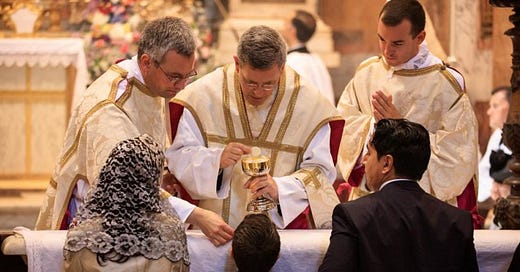Many of us are aware and would be careful to not receive Holy Communion before going to the Sacrament of Confession in the case of really really serious sin, such as those against chastity, etc.
We’re also probably careful about the rules on “fasting” before receiving Holy Communion, hilariously presuming of course that we can call not eating or drinking for an hour as the current standing rule says to truly be fasting.
But beyond these narrow cases, we’re not really that careful about preparing our heart and examining our conscience the rest of the time.
One reason is pure neglect, not thinking.
But the other reason is social. If you don’t go up to receive Holy Communion, you subconsciously realize, everyone will notice you—and wonder. The ensuing social pressure makes most of us, afraid of people “wondering” too far about us having committed some secret serious sin, just go up and receive Holy Communion, even if we aren’t truly prepared.
Even if we consider our heart and realize that we might not be prepared due to having some sin, some lack of charity, something encumbering our heart against Divine charity, both in receiving it and in passing it on, we often still receive Holy Communion because we don’t want to look “off” or as bigger sinners than we already are.
The social pressure amidst Catholics, and especially amidst more traditionally Catholics to preserve an external appearance of sanctity is crazy. There are many ways this leads to problems in our living the Christian life more generally,1 including often a preference for the back pew,2 but when it comes to Holy Communion in particular, we’re hyper conditioned now to receive, just so we don’t look like we’re guilty of some more serious sin.3
This social pressure, of course, is relatively modern, as receiving Holy Communion, until quite recently, was quite rare for the faithful attending Mass, with Pope Leo XIII in Mirae Caritatis and Pope St. Pius X in Sacra Tridentina arguing for more frequent reception of Holy Communion. On the whole, of course, this was probably a good thing. It’s good that Catholics on average began to receive Holy Communion more and that the social pressure flipped directions towards encouraging everyone to get up and receive Christ.
But once the social norm, the mimetic pressure, changed from Holy Communion being a rare thing that one took seriously, ensured that they properly prepared for, and approached with reverence, the new status quo began to breed overfamiliarity, thoughtlessness, and sometimes, actual scandal.
We’re well aware of the many cases of scandalous reception of the Eucharist around us today in the Church more broadly. But Christ’s words in the Gospel of Matthew should give us further warning and pause that even the more serious Catholics amidst us probably need to take preparation for the Sacrament even more carefully:
But I say to you that every one who is angry with his brother shall be liable to judgment; whoever insults his brother shall be liable to the council, and whoever says, ‘You fool!’ shall be liable to the hell of fire. So if you are offering your gift at the altar, and there remember that your brother has something against you, leave your gift there before the altar and go; first be reconciled to your brother, and then come and offer your gift.4
Although sometimes forgotten, there are serious sins beyond those against chastity that should give us pause before going up to receive Christ in the Sacrament. Of course the Penitential Act as well as Holy Communion itself act for the remission of sins, the more general warning of Christ admonishes us of the scandal of approaching the fullness of Communion with Christ and with each other through the Sacrament if we are at serious odds of anger, hatred, scandal, and the like against each other outside of the Liturgy. Should we not also think twice if we are cheating our neighbor, employer, or employee in “real life” before receiving Christ’s body and entering into the fullness of communion with our neighbor in the Body of Christ?
One could of course take this too far, and become so overly scrupulous, as I sometimes am about my “heart” feels before receiving Holy Communion. It is easy to take “caution” so far that we return to the earlier practices of infrequently going up to the fountains of grace. Scrupulosity, at its root, is a lack of faith, hope, and charity rolled up into one that is also deadly to the spiritual life.5 We should avoid the extreme of never thinking we’re ready by reminding ourselves that we never truly are prepared. Christ calls us while we are still sinners6 and the Sacraments make us worthy to receive their grace by God simultaneously applying the grace that make us worthy.
But we ought, at least, to think twice, at least as an act against overfamiliar disrespect of Christ’s Real Presence and gift of Himself to us.7 A little caution would also at least help break the overly mimetic, overly concerned with appearance attitude of just “going up with the crowd.” It’s an also act of humility to be cautious even to the point of others making false judgements in their hearts about us. And, at the very least, it is an act of prudence to not gamble with receiving the Body of Christ in vain.
At the very least, when attending Holy Mass, think twice, and if you are prepared to receive Christ in Mass that day, give thanks, and if not, repent, and give thanks for the opportunity given to grow in humility, resolve what separates you from worthy Communion, and fix it for next time.
Social pressure and even the selfish desire to “look Holy” can be a good thing, but in this case its good to ensure that it doesn’t lead you to miss the point. Perhaps the separation, briefly, from receiving Christ physically in times when we are truly indisposed, can make us grow in charity and deeper desire for our next opportunity to receive Christ in the Sacrament.
Including, I admit, making rash judgements on certain recent disputes between Catholic writers in order to “follow the crowd” in condemning or cancelling one author or another before truly taking the time to judge the case on its merits and in charity.
Amidst more traditional Catholics, I admit, the psychology is probably reversed, and Pharisaically sometimes the failure-mode or vice is to seek out the front pew for the sake of drawing attention to one’s personal sanctity:
Social pressure also is another reason I didn’t mention enough in my earlier piece that makes people “go Byzantine”:
Matthew 5:22-24
Romans 5:8
The general question of the real motives behind our prayers is something we all should be considering from time to time:











When they started Communion in the hand, many people lost the belief in the Real Presence. I still can't think of a good reason for why they did that. I can think of some bad reasons.
Priest's hands are consecrated with oil at ordination so that they may handle the Blessed Sacrament. Up until the mid 70's in the US, a layperson handling the Eucharist was considered a sacrilege.
Cardinal Bernadine of Chicago is the one who really pushed for communion in the hand. In "Windswept House", he's the Cardinal of Century City.
This is a very important topic indeed. I have struggled with scrupulosity for years now, and even then the temptation to think, "What will they think?" was present in my mind. Granted, I was not abstaining for a purpose rather than to placate my scruples, but it simply proves how strong that temptation is. I'm glad you wrote about this topic, because pride and vanity really can lead to receiving unworthily. We must cultivate a healthy "it doesn't matter what people think" attitude. What is ironic is that most of the culture at large has that attitude about almost everything, but will still shiver about people's opinions where truly important things are concerned.